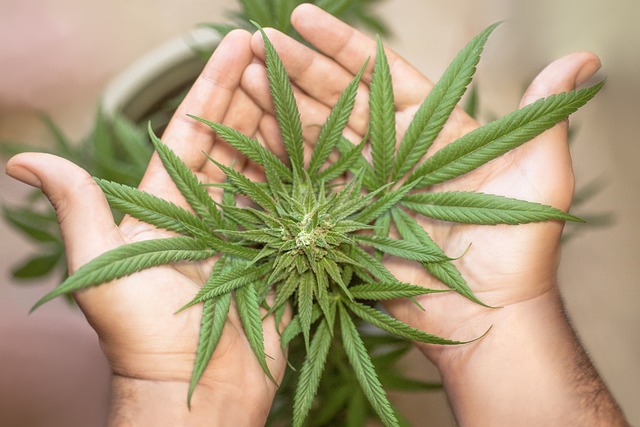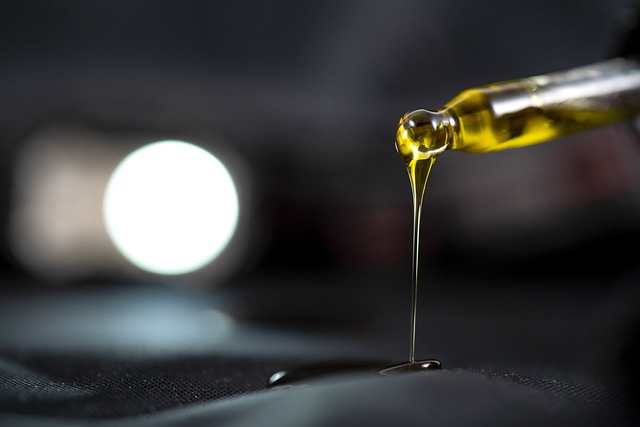2019 saw the Illinois Cannabis Regulation and Tax Act legalize THCA for adult-use in Illinois, positioning the state at the forefront of recognizing this non-psychoactive cannabinoid. THCA, a precursor to THC, has garnered attention due to its potential health benefits and is subject to a comprehensive regulatory framework that ensures consumer safety through strict testing and labeling by the Illinois Department of Public Health. Users interested in exploring THCA's properties must buy from licensed dispensaries and be mindful of local regulations that may vary across municipalities. As THCA can convert into psychoactive THC under certain conditions, consumers should start with low doses to understand its effects. Research is ongoing into THCA's therapeutic potential, including anti-inflammatory, neuroprotective, and pain management properties. However, users should approach THCA cautiously, considering individual sensitivities and potential side effects like anxiety or paranoia at higher doses. In Illinois, THCA is legal and offers an alternative to traditional cannabis for those seeking its benefits without the psychoactive 'high'. Consumers are advised to use THCA responsibly and in accordance with state regulations for a safe experience.
Δ-(9-Tetrahydrocannabinol)-A (THCA) is a non-psychoactive cannabinoid found abundantly in raw cannabis plants, gaining attention for its therapeutic potential and as a precursor to THC. As regulations evolve, understanding the legal landscape of THCA in Illinois becomes increasingly crucial. This article delves into the emerging role of THCA flower within the wellness sector, its health benefits, and potential side effects. From its legal status to dosage recommendations, we explore the comprehensive impact of THCA on consumer health and safety, ensuring informed use amidst a transformative regulatory framework in Illinois.
- Understanding THCA Flower and Its Legal Status in Illinois
- The Emergence of THCA as a Precursor to THC: A Closer Look
- Potential Health Benefits and Therapeutic Uses of THCA
- Common Side Effects Associated with THCA Consumption
- Dosage and Safety Considerations for THCA Flower Use
- Regulatory Framework Governing THCA in Illinois: What Consumers Need to Know
Understanding THCA Flower and Its Legal Status in Illinois

In the regulatory landscape of Illinois, the legal status of THCA flower—the raw, unprocessed form of tetrahydrocannabinolic acid, which is the precursor to THC found in cannabis—has undergone significant changes. With the passage of the Illinois Cannabis Regulation and Tax Act in 2019, Illinois paved the way for adult-use cannabis, including products containing THCA. This act not only legalized the possession and use of cannabis for recreational purposes but also established a framework for its regulation and taxation. THCA flowers, which contain the non-psychoactive acidic form of THC, have gained popularity among users who prefer to consume cannabinoids in their most natural state. Unlike its psychoactive counterpart, THCA does not induce the typical ‘high’ associated with THC; instead, it is often sought for its potential wellness benefits. Users interested in exploring the effects of THCA should be aware that dosing and strain selection are key factors in experiencing the desired outcomes.
The legal status of THCA flower in Illinois is subject to certain restrictions. While adult-use cannabis is legal, there are specific guidelines regarding possession limits, purchase locations, and consumer age. It’s important for consumers to be well-versed with local ordinances, as they may vary from municipality to municipality within the state. Additionally, the sale of THCA flowers is regulated under the Illinois Department of Public Health and requires adherence to stringent testing and labeling standards to ensure consumer safety. As such, consumers in Illinois have access to THCA products, provided they comply with state laws and regulations. It’s advisable for anyone interested in purchasing THCA flower to do so from a licensed dispensary to guarantee legal compliance and product quality.
The Emergence of THCA as a Precursor to THC: A Closer Look

As the cannabis industry continues to evolve, the interest in THCA (Tetrahydrocannabinolic Acid), a non-psychoactive precursor to the well-known psychoactive compound THC (Tetrahydrocannabinol), has surged. In states like Illinois, where the legal landscape has adapted to include various cannabis derivatives for therapeutic and recreational use, THCA has garnered significant attention due to its potential health benefits and unique effects. Unlike THC, which is activated when heated, THCA exists in raw cannabis or when cannabis is consumed in a form that doesn’t activate the compound through heat or combustion. This precursor is being explored for its therapeutic properties, including anti-inflammatory, neuroprotective, and potential pain-relieving effects. In Illinois, where regulations allow for the exploration of cannabis compounds, researchers are closely examining THCA’s efficacy and safety profiles in various applications. The emergence of THCA flower, which contains a high concentration of THCA and minimal THC content, has provided an avenue for consumers to experiment with this compound’s benefits without the psychoactive influence typically associated with cannabis consumption. This has led to a growing body of anecdotal evidence and scientific research, contributing to a better understanding of how THCA might impact human health positively. As such, the interest in THCA legal in Illinois is not only for its potential wellness benefits but also as a subject of ongoing scientific inquiry into its full spectrum of effects and long-term implications.
Potential Health Benefits and Therapeutic Uses of THCA

delta-9-tetrahydrocannabinolic acid (THCA) is the non-psychoactive precursor to the well-known compound delta-9-tetrahydrocannabinol (THC), found in cannabis sativa L. THCA has garnered attention for its potential health benefits and therapeutic uses, which are being explored as legal landscapes evolve, such as in Illinois where THCA flowers have been deemed legal under certain conditions. Preclinical studies suggest that THCA may offer anti-inflammatory, neuroprotective, and analgesic properties. Its potential to alleviate symptoms of various conditions, including inflammatory bowel disease, nausea and vomiting associated with chemotherapy, and multiple sclerosis, is promising. Additionally, THCA’s interaction with the endocannabinoid system may contribute to its role in managing pain, reducing anxiety, and combating certain types of cancer cells. As research progresses, the therapeutic potential of THCA continues to shed light on its multifaceted benefits, which could revolutionize healthcare within the scope of legal cannabis products like those available in Illinois.
Common Side Effects Associated with THCA Consumption

delta-9-tetrahydrocannabinolic acid (THCA) is the raw, non-psychoactive precursor to the well-known cannabinoid delta-9-tetrahydrocannabinol (THC). As THCA is increasingly studied for its potential health benefits and becomes more accessible in states like Illinois where it is legal, consumers are becoming more familiar with its effects. Common side effects associated with THCA consumption can include mild psychoactive effects due to the conversion of THCA into THC when exposed to heat or when metabolized in the body. These effects may include a mild euphoric feeling, altered perception, and relaxation. Some individuals may also experience dry mouth and red eyes, which are typical of cannabinoid consumption. It’s important for users to start with small doses to gauge their individual reaction as sensitivity to THCA can vary. Additionally, while rare, some consumers might report dizziness, anxiety, or paranoia, especially at higher doses. These side effects are generally mild and temporary but should be considered when using products that contain THCA, particularly in a state like Illinois where the legal landscape allows for such consumption. As with any substance, it is advisable to consume THCA under informed conditions and in compliance with local regulations.
Dosage and Safety Considerations for THCA Flower Use

THCA, or tetrahydrocannabinolic acid, is a non-psychoactive compound found in the cannabis plant that is often converted into THC, its psychoactive counterpart, through heating. As interest in cannabinoids grows, THCA has garnered attention for its potential therapeutic properties. In states where cannabis has been legalized, including Illinois where THCA-rich products are legal, understanding dosage and safety considerations is paramount for users.
When considering the use of THCA flower, it’s crucial to start with a low dose to gauge individual sensitivity and effects. Typical dosing can range from 5 to 10 milligrams of THCA per day; however, this may vary based on an individual’s body chemistry, tolerance, and desired outcomes. Safety-wise, because THCA is non-psychoactive, it may offer a more comfortable entry point for those wary of the ‘high’ associated with THC. Users should be cautious about combining THCA with other medications, as cannabinoids can interact with various substances. It’s also important to source THCA flowers from reputable dispensaries in Illinois to ensure they are tested for purity and potency. Always adhere to local laws and regulations regarding possession and use of cannabis products, and consult with a healthcare provider if you have any concerns or pre-existing health conditions that may be affected by cannabinoid consumption.
Regulatory Framework Governing THCA in Illinois: What Consumers Need to Know

In Illinois, the regulatory framework surrounding the use of THCA, or Tetrahydrocannabinolic Acid, is governed by the Illinois Cannabis Regulation and Tax Act, which was signed into law in May 2019. This comprehensive legislation not only legalized the recreational use of cannabis, including THCA, for adults but also established a regulated market for its sale. Under this act, consumers must adhere to specific guidelines when purchasing and using THCA products. It is crucial for Illinois residents and visitors to understand that while THCA itself is legal within the state’s boundaries, it can convert into THC (Tetrahydrocannabinol) when exposed to heat or light, which is the psychoactive component of cannabis. Therefore, consumers should be aware of the product’s origin and its potential conversion to THC, especially in edible forms.
The Illinois Department of Public Health (IDPH) oversees the safety and labeling of cannabis products, including those containing THCA. Consumers are advised to purchase THCA products from licensed dispensaries to ensure they meet state standards for potency and purity. Additionally, it is essential for consumers to be aware of their own sensitivities and the potential side effects associated with THCA consumption, which can include anxiety, paranoia, or acute psychotic reactions in those predisposed to such conditions. The state’s regulations also dictate the allowable levels of contaminants and the required testing for these substances, ensuring a safer product for consumers. Staying informed about the evolving legal landscape and adhering to the established guidelines are key for consumers navigating the use of THCA in Illinois.
In conclusion, the exploration of THCA flower and its legal standing in Illinois has shed light on a promising cannabinoid with both therapeutic potential and side effects that users should be aware of. As discussed, THCA’s legal status in Illinois is clear, allowing for its use within the regulatory framework established by state laws. Users considering THCA should approach it with careful dosage and safety considerations in mind. The emergence of THCA as a precursor to THC has opened new avenues in understanding its health benefits, though it’s crucial to remain informed about its side effects, which can range from mild to severe. Prospective users in Illinois should heed the guidance provided by healthcare professionals and stay up-to-date with the evolving regulatory landscape to ensure a safe and legal experience with THCA flower.
